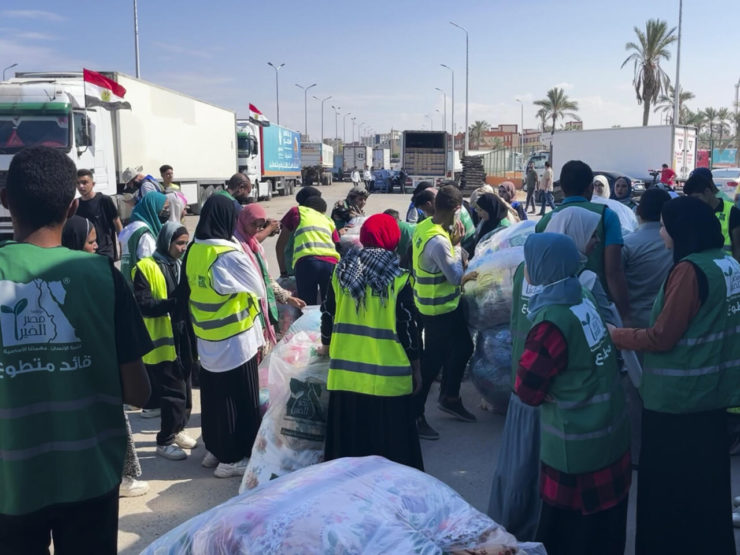
Nearly two weeks after the current conflict erupted in the Middle East, aid trucks were finally allowed to cross the Egyptian border into Gaza, carrying much-needed aid supplies and food to the beleaguered citizens. 20 trucks entered Gaza from the Rafah crossing in Egypt, a fraction of the 200 or so trucks already positioned at the border at that time.
The delivery through Egypt, though a welcome development, came after strong denials from both it and Jordan to accept refugees from Palestine and to intervene in the conflict in any way, including the delivery of aid. Both Egypt’s President el-Sissi and Jordan’s King Abdullah II have both released statements since October 7th, emphatically denying the possibility of either country accepting Palestinian refugees attempting to flee Israeli bombings. Both leaders have quoted the already significant number of displaced Palestinians in asylum in their countries, and say that to accept more would be tantamount to undermining the Palestinian struggle for an independent homeland and is part of Israel’s attempts to “push the civilian inhabitants to … migrate” to these countries.
Both Egypt and Jordan, along with other nearby Arab states such as Syria, have engaged in war with Israel before. The 1973 Yom-Kippur War saw these states invade Israeli territory in a surprise attack but were beaten back, and they had suffered even worse defeats in the 1967 Six-Day Arab-Israeli war.
Millions of Palestinian refugees now live in territories within these states’ borders, often adjacent to the Israeli-occupied West Bank. Many in Jordan and Egypt also fear that Hamas fighters live amongst these refugees, and allowing more of them into Egypt’s Sinai region, for example, would lead to more ramifications for the country in terms of domestic instability and the use of Egyptian soil as a base to launch attacks against Israel. This would draw Egypt into war with Israel again, which would end the 4-decade long peace agreement the two countries have had since the end of the 1970s.
Arab states otherwise have also had differing reactions to the crisis. Whilst states such as Qatar, Syria and Yemen have condemned Israel for its attacks, most others, such as Saudi Arabia, the UAE, and even Egypt have issued statements that have held back from outright criticism of Israel and called for action to reduce the toll on civilian life on both sides and avoid escalation. Within these statements, many still acknowledge the role that Israel’s long and brutal occupation of Palestinian territory has played in causing these events to come around.
Since then, Arab states have congregated at the Arab Islamic Summit on the 11th of November. Whilst statements from Arab world leaders such as Saudi’s Crown Prince Muhammad bin Salman condemned Israel’s aggression and called for a cessation of hostilities, these states have also earlier rejected the use of embargos on oil exports to Israel and other Western states and conduct business-as-normal. Thousands of people across the Middle East are protesting in favour of the Palestinian cause, denouncing not just Israel and American complicity, but also their own states’ perceived spinelessness.
How does one explain the action – or perhaps inaction – of the Arab states in this latest eruption of conflict? Perhaps much of it comes from the unprecedented developments in just the last year that have led to the normalising of ties between many of the Gulf States such as the United Arab Emirates and Israel.
The normalisation of diplomatic relations between much of the Middle East and Israel had differing reactions, with many hoping it would allow for peace to persist in a region wracked by conflict for decades. But other, more cynical (or perhaps realistic) voices saw it as Gulf States compromising on fundamental social and political commitments – such as to the Palestinian cause – for economic gain. In the face of recognition of Israel and its legitimacy, people feared that states that had hitherto supported the Palestinian cause would now stand by idly and watch Israel only increase its oppression of the West Bank. As such, some feel that the unexpected Hamas attack is an attempt to derail these same negotiations between Israel and Saudi-Arabia, the ‘leader’ of the Arab World in many ways.
Many of these states are also wary of Iranian influence in the region, being the backing force behind different groups such as Hamas in Gaza and Hezbollah in Lebanon, and political regimes in Iraq and Yemen. Lebanon, for example, has feared that it might get dragged into war unnecessarily due to the actions of Hezbollah against Israel, the former being based largely on Lebanese territory. States such as Egypt and especially Lebanon cannot afford war at the same time as they are facing huge economic crises, and suspect that Iranian influence over escalating conflict might force them to have to do just that.
Though the Arab Islamic Summit has tried to coordinate some level of Arab sentiment on Gaza, many feel that it is just “for the sake of a semblance of unity” and that these states have no concrete objectives for solving the crisis in Gaza. While the conflict drags on for over a month and a half, these states have done little to coordinate actual aid for the civilians and for combatting Israeli aggression through military or other means. During this time when they have paid their lip service, nearly 15,000 Palestinians have been killed in Gaza. The Arab states have failed them.
Taut Bataut – is a researcher and writer that publishes on South Asian geopolitics, exclusively for the online magazine “New Eastern Outlook”.
